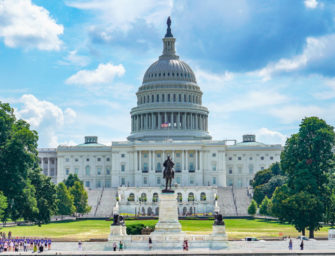AGU Board of Directors Meeting, April 2023
The April meeting of AGU’s Board of Directors began with an acknowledgment of our decade-long partnership with retiring EVP of Science, Brooks Hanson. We bade him a fond farewell as we acknowledged his prolific and valuable contributions to the organization and the people it serves.
In typical fashion, our meeting mixed information, discussion and action with development and oversight activities. We broke the ice with a generative discussion on solutions, then tackled topics including learning strategy, membership research, meeting conduct and security, crisis communication, branding, financial outcomes and forecasts, objectives and key results, publications, and climate intervention.
To support and inspire
To kick things off, President Lisa Graumlich, President-Elect Brandon Jones and CEO Randy Fiser seeded our discussions with guidance and inspiration. We were urged to experiment boldly, choose words wisely, strive for partnership and act with intention. Respect for one another, members and staff knit our conversations together in ways that led to concerted action and understanding.
Key themes to our conversation and engagement wove through all three days of meetings. The first of these was progress through conflict, that is, learning from testing, failing, reassessing, and trying again. At AGU, we commonly refer to this as experiment, learn and adapt. This method underpins our research as scientists, so it’s no surprise to see it fruitfully applied to governance as well. In our generative discussion on solution science, we explored the concept that solutions are pathways that require constant remapping and reevaluating to advance. In detailed and frank discussions about meeting conduct and security, we recognized that each time we meet in a rapidly changing landscape we are presented with unique circumstances, and it is our responsibility as members to learn from past mistakes and work to mitigate future risks. AGU’s progress toward open access in publications is an example of how the organization has tested a new concept, with adjustments ultimately leading to success. We resolved to be willing to learn from unexpected events and not to fear doing things differently.
In many of our conversations, we acknowledged a gap between AGU’s mission and the opportunity for our members to engage and positively impact that mission. We recognize that this disconnect opens a space in which we can take positive action toward our vision of a thriving, sustainable and equitable future. Initial membership research from Highland Solutions has already produced key insights to guide progress, and we are delighted that this partnership will remain in place as volunteer leaders and staff lean into connecting with, supporting, and inspiring our members throughout their careers. We also understand that our communication, internally and externally, is supported by membership engagement with the mission. Especially in times of crisis, we are working on ways to improve the timeliness, clarity, and dissemination of messages, and we are committed to remaining in harmony with our values of excellence, integrity, respect, diversity, and collaboration as well as science education and outreach, as we do so.
Finally, we continued to return to the idea that HOW we do what we do—the way the message is delivered—is every bit as critical as the action. It is not enough to do good work; we also want to work in a good way. As we talked through issues related to communicating in a crisis, we agreed that bullying behavior, no matter the message it supports, is unacceptable to AGU. And as we received an update on the process of creating policy statements at AGU, we saw the integration of all three themes toward an excellent result. The policy statement on Climate Intervention Research has been through several iterations and revisions, each with expert writing panels and input from members. The result is a robust message delivered in a respectful way, and the Board was pleased to add its approval to that of the Council for the statement’s release. As we move in partnership with other organizations to craft an ethical framework for climate intervention, we are again stepping into an area of uncertainty as well as the promise that holds the potential to help us meet our mission to support and inspire our global community of Earth and space scientists.
A thriving, sustainable and equitable future
We made progress at our Board meeting, not because of what we did but because of how we did it. We used the scientific method not only for research, but to impact society in how we make decisions. We worked to better align AGU’s spectacular mission with our rich and diverse membership, and we continued our thoughtful journey toward a thriving, sustainable and equitable future supported by scientific discovery, innovation, and action.



There are no comments
Add yours